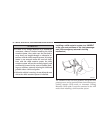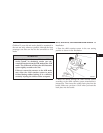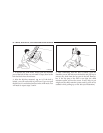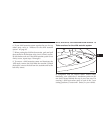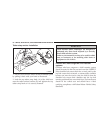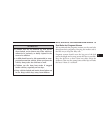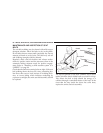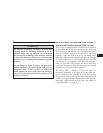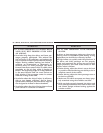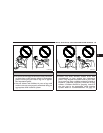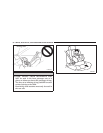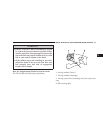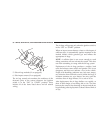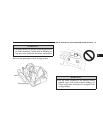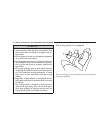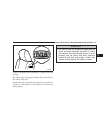
WARNING!
• IT IS VERY IMPORTANT TO ALWAYS WEAR
YOUR SEAT BELT PROPERLY EVEN WITH
AN AIR BAG.
• Seat belts help keep the driver and front pas-
senger properly positioned. This reduces the
risk of injury in all collisions, and reduces the
risk of serious or fatal injuries when the air bags
inflate. During sudden braking just before a
collision, an unrestrained or improperly re-
strained driver or front passenger can move
forward into direct contact with, or within close
proximity to, the air bag when it begins to
inflate. The beginning stage of air bag inflation
is the most forceful and can cause serious or
fatal injuries if the occupant comes in contact
with the air bag at this time.
• Seat belts reduce the risk of injury in rollovers,
side or rear impact collisions, and in lower-
speed frontal collisions, because the air bags are
not designed to inflate in those situations.
• Seat belts reduce the risk of being thrown from
your vehicle in a collision or rollover.
WARNING!
• IT IS VERY IMPORTANT TO BE PROPERLY
SEATED.
A driver or front passenger sitting too close to the
steering wheel or instrument panel during air bag
deployment can be killed or seriously injured
Air bags inflate very quickly and with great force. If
the driver and front passenger are not properly
seated and restrained, the air bag may not provide
proper protection, and could cause serious or fatal
injuries when it inflates.
• Before driving, adjust the driver’s seat as far back
as possible without affecting your ability to be in
complete control of the vehicle.
• Before driving, adjust the front passenger seat as
far back as possible.
• Make sure all vehicle occupants are always prop-
erly restrained using the available seat belts.
• With seat belts properly fastened, the driver and
front passenger should sit well back in their seats
and remain upright without leaning against the
window or door.
88 SEATS, SEAT BELTS, CHILD RESTRAINTS AND AIR BAGS



